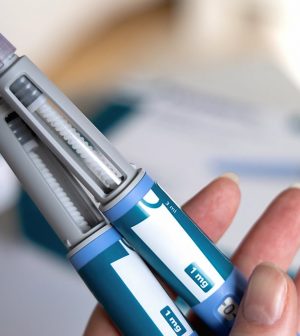- Could Your Grocery Store Meat Be Causing Recurring UTIs?
- Are You Making This Expensive Thermostat Error This Winter?
- Recognizing the Signs of Hypothyroidism
- 10 Strategies to Overcome Insomnia
- Could Artificial Sweeteners Be Aging the Brain Faster?
- Techniques for Soothing Your Nervous System
- Does the Water in Your House Smell Funny? Here’s Why
- Can a Daily Dose of Apple Cider Vinegar Actually Aid Weight Loss?
- 6 Health Beverages That Can Actually Spike Your Blood Sugar
- Treatment Options for Social Anxiety Disorder
FDA Approves Generic GLP-1 Medicine For Diabetes Treatment

THURSDAY, Dec. 26, (2024 HealthDay News) — The U.S. Food and Drug Administration (FDA) announced on Monday the approval of the first generic version of a daily injectable GLP-1 medicine for people living with Type 2 diabetes.
Liraglutide, the generic for Victoza, is similar to semaglutide, the active ingredient in the popular weight-loss drug Ozempic.
The FDA supports the development of generic drugs, such as GLP-1s, by funding research and informing industry through guidance, Dr. Iilun Murphy, director of the FDA’s Office of Generic Drugs, said.
“Generic drugs provide additional treatment options which are generally more affordable for patients,” she said in a statement released Dec. 23, 2024.
“Today’s approval underscores the FDA’s continued commitment to advancing patient access to safe, effective and high-quality generic drug products.”
Last month, the agency approved the first generic version in this class of medications with the green lighting of a generic version of Byetta (exenatide).
Experts hope the new approvals will help prevent shortages triggered by demand for injectable weight loss and type 2 diabetes drugs, including semaglutide (Ozempic, Wegovy) and tirzepatide (Mounjaro, Zepbound).
Liraglutide is expected to expand access for people managing type 2 diabetes, which affects more than 38 million Americans, according to federal health data.
Type 2 diabetes is a chronic condition that occurs when the body does not use insulin well and cannot keep blood sugar at normal levels. It is usually diagnosed in adults, but has been increasingly diagnosed in children and teens.
Liraglutide improves blood sugar levels by creating similar effects in the body as GLP-1 in the pancreas, which is often found in insufficient levels in those with type 2 diabetes.
The prescribing information for the generic version includes a warning about the increased risk of thyroid C-cell tumors.
For this reason, patients who have had, or have family members who have ever had medullary thyroid carcinoma should not use liraglutide, nor should those who have an endocrine system condition called multiple endocrine neoplasia syndrome type 2.
The most common side effects reported in the clinical trials for liraglutide injection include nausea, diarrhea, vomiting, decreased appetite, dyspepsia and constipation.
More information
The American Diabetes Association has more on diabetes medications.
SOURCE: FDA, news release, Dec. 23, 2024; CNN
Source: HealthDay
Copyright © 2026 HealthDay. All rights reserved.










